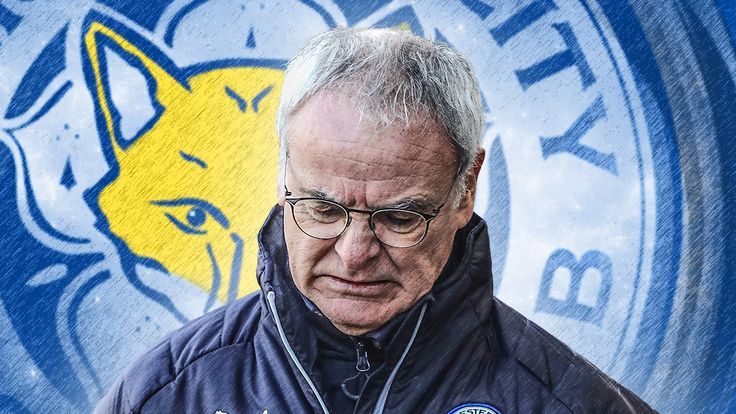
Saturday 25 February 2017 10:27, UK
Claudio Ranieri's fairy tale has reached a sad end but his role in Leicester's title triumph should not be downplayed, writes Nick Wright.
One point above the relegation zone and without a Premier League win since New Year's Eve, Leicester had plenty of reasons to sack their manager. The man who masterminded last season's 5,000-1 title triumph seemed at a loss to stop their slide, and it didn't take much detective work to see that the dressing room was no longer with him.
In purely footballing terms, it was understandable. Leicester's owners described it as the most difficult decision they have had to make since their takeover in 2010, yet the reality was simple. Relegation threatened the long-term future of the club. From Aston Villa to Blackburn, the bottom half of the Sky Bet Championship is littered with big clubs struggling to find a way back.
But it is impossible to ignore the sentimental side of it. It is just 298 days since Ranieri lifted the Premier League trophy in front of an elated King Power Stadium, capping one of the greatest achievements in sporting history and etching his name into football folklore. That Leicester had just returned from Seville with a crucial Champions League away goal made the decision all the more brutal.
The outpouring of support came as no surprise. Former Leicester striker Gary Lineker described the sacking as "inexplicable, unforgivable and gut-wrenchingly sad", and he wasn't alone in his outrage. Alan Smith said it was the "biggest surprise in a decade", while Jamie Carragher insisted Leicester should already be working on a statue of Ranieri outside the stadium.
Ranieri earned the adoration of football fans everywhere last season, but their disastrous title defence and his subsequent sacking has also prompted some observers to question the extent of his influence in their historic Premier League triumph. Was it a freak success which came down to the players? Was the Italian merely a facilitator?
There is a temptation to downplay his role - something the senior players who complained to Leicester's owners would surely support - but last season's success had Ranieri right at the heart of it. He inherited a team which had almost been relegated, eschewing his usual methods to create an environment which bred unprecedented success.
"When speaking to the players, I realised they were afraid of Italian tactical approaches," he said in an illuminating interview with Corriere della Sera in April. "What football means to an Italian coach is tactics, trying to control the game by following the ideas and systems of the manger.
"They didn't seem convinced and neither was I. I have a lot of admiration for those who build new tactical systems, but I always thought the most important thing a good coach must do is build the team around the characteristics of his players. So I told the players that I trusted them and would speak very little of tactics."
But it was not a case of sitting back and leaving them to it. Ranieri adapted. He abandoned the back three which had helped Nigel Pearson steer Leicester to survival a few months earlier, making an inspired switch to 4-4-2 and fine-tuning an unconventional system which made his team an absolute nightmare to play against.
From Jamie Vardy and Riyad Mahrez to Wes Morgan and Robert Huth, Ranieri brought brilliance out of players who never looked like they had it in them. Leicester worked tirelessly for every minute of every game. Ranieri even kept squad players happy without upsetting the balance of the team.
His simple but effective tactics outwitted the Premier League's heavyweights, and even when Leicester stumbled, it was him who kept the pressure off. He lowered expectations with his jovial media appearances, while raising them for their title rivals. He is not typically associated with the dark arts of mind-games, but his repeated assertions that Tottenham would win every game got to them in the end.
In short, Ranieri's fingerprints were all over Leicester's success. He could not find the answers to their slide down the table this season, but their struggles are only so startling because of how high he raised the bar himself. It is a sad end to an extraordinary story, but Ranieri leaves with his legacy untarnished. For all that went wrong this season, it is what came before that will live longest in the memory. The manager's role in it must not be forgotten.